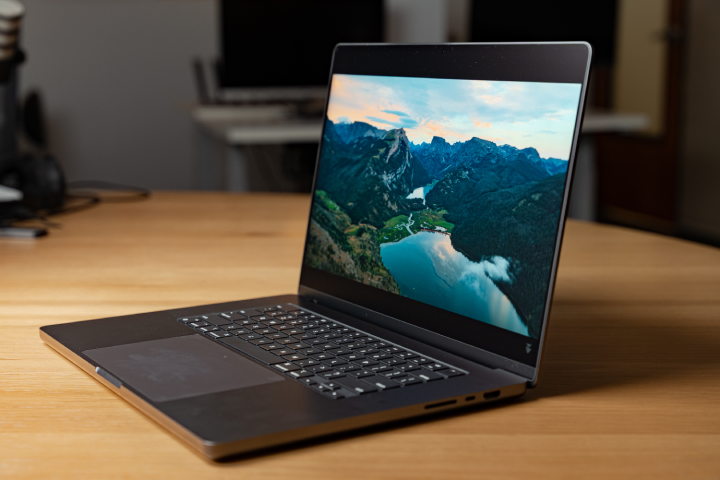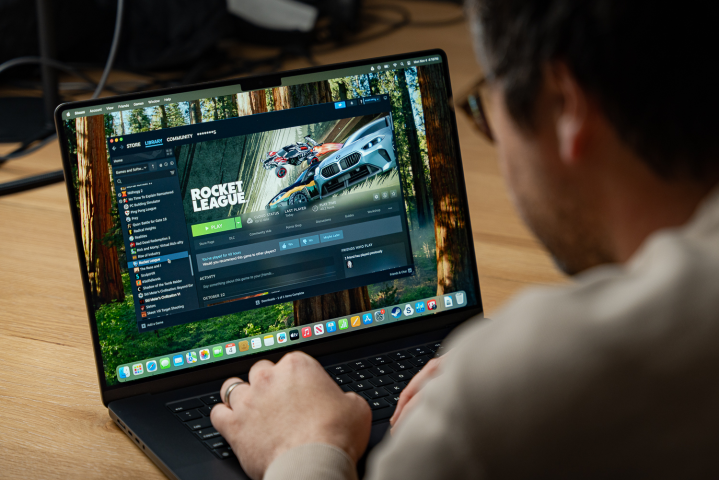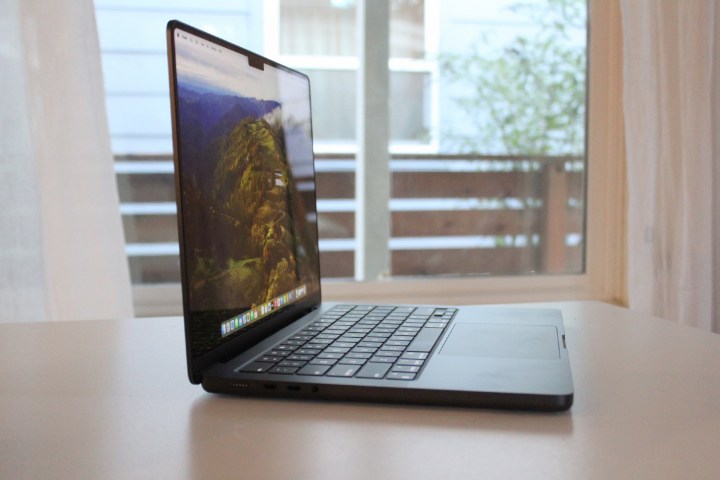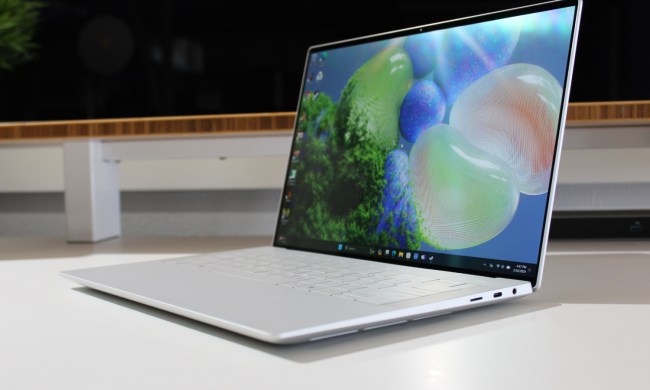
MacBook Pros are some of the best laptops money can buy. With the M4 chip now onboard, these laptops have never been so powerful, and the update brings some interesting upgrades, such as the improved 12-megapixel webcam and brighter screen. They’re the best MacBooks that have ever been made, and it’s a perfect time to pick one up based on upgrade timing.
But just because the entire MacBook Pro lineup is better now, that doesn’t mean it’s any easier to choose between the two size options that are available. Despite the fact that they include many of the same features, the 14-inch MacBook Pro and 16-inch MacBook Pro feel like entirely different systems due to their contrast in size.
There are a few key differences between the two M4 MacBook Pro models that you need to know about. So, before you rush out and purchase one, it pays to know exactly what’s different between them.
Specs
| Apple MacBook Pro 14 | Apple MacBook Pro 16 | |
| Dimensions | 12.31 inches x 8.71 inches x 0.60 inches | 14.01 x 9.77 x 0.66 inches |
| Weight | 3.5 pounds | 4.7 pounds |
| Processor | Apple M4 (10-core) Apple M4 Pro (12-core, 14-core) Apple M4 Max (14-core, 16-core) |
Apple M4 Pro (12-core, 14-core) Apple M4 Max (14-core, 16-core) |
| Graphics | M4: 10-core M4 Pro: 16-core, 20-core M4 Max: 32-core, 40-core |
M4 Pro: 20 -core M4 Max: 32-core, 40-core |
| RAM | M4: 16GB, 24GB, 32GB M4 Pro: 24GB, 48GB M4 Max: 36GB M4 Max (40-core): 48GB to 128GB |
M4 Pro: 24GB, 48GB M4 Max: 36GB M4 Max (40-core): 48GB to 128GB |
| Display | 14.2-inch 16:10 Liquid Retina XDR 3024 x 1964 resolutionn, 120Hz | 16.2-inch 16:10 Liquid Retina XDR 3456 x 2234 resolution 120Hz |
| Storage | M4: 512GB to 2TB M4 Pro: 1TB to 8TB M4 Max: 36GB to 128GB |
M4 Pro: 1TB to 8TB M4 Max: 36GB to 128GB |
| Ports | 3 x Thunderbolt 4 (M4) 3 x Thunderbolt 5 1 x HDMI 2.0 1 x 3.5mm audio jack SD card reader |
3 x Thunderbolt 5 1 x HDMI 2.0 1 x 3.5mm audio jack SD card reader |
| Wireless | Wi-Fi 6E and Bluetooth 5.3 | Wi-Fi 6E and Bluetooth 5.3 |
| Webcam | 12-megapixel | 12-megapixel |
| Operating system | macOS Sonoma | macOS Sonoma |
| Battery | 72.4 watt-hour | 100 watt-hour |
| Price | $1,599 | $2,499 |
Design

If you’ve taken a close look at the previous iterations of MacBooks, examining the new ones won’t reveal much that’s new. These laptops look nearly identical to the M1 models that came out in 2021.
They also look identical to each other. Same keyboard, rounded edges, notched display, and color options. Silver and Space Black are the two color options now, with Space Gray having been replaced across the board — even on the base M4 14-inch model. The 16-inch MacBook Pro does have a larger trackpad to fit the expanded palm rests and keyboard deck, but it’s more for the visuals of the design than anything practical.
The primary deciding factor between these two devices is really about portability and screen size. Neither are as razor-thin as the MacBook Air, but aren’t overly chunky either. The 16-inch MacBook Pro is slightly thicker, though, and more importantly, is significantly heavier. Weighing in at 4.7 pounds, this thing is definitely heavy in the hand or in a bag. An extra 1.2 pounds doesn’t sound like a ton, but you’ll definitely notice its presence.
The 14-inch MacBook Pro, on the other hand, is fairly portable. Despite being able to configure it up to the same M4 Max chip, it’s astoundingly compact — enough so that traveling with it doesn’t feel like a burden. I can’t say the same for the 16-inch MacBook Pro.
Display

While the screen is a key distinguishing factor between these two laptops, there’s no difference in quality. Both devices have the same fantastic mini-LED Liquid Retina XDR screen. They are a huge jump over the IPS screen on the MacBook Air and even have some advantages over the current crop of the best OLED laptops out there.
While it’s true that the screens have a different resolution, they equal out to the same pixel density, meaning they look equally sharp. These are the best laptop displays you can buy right now, and they offer the best HDR experience you’ll find on a laptop too.
With this new M4 generation of MacBook Pros, you even get two improvements to the displays. First off, the screens can now be cranked up to 1,000 nits in SDR content. That’s extremely bright — almost twice the max brightness of the previous generation. The only caveat is that these insanely high levels of brightness can only be reached under harsh lighting, such as while working outside on a bright day. You can’t manually get them to 1,000 nits, either — it has to be adjusted automatically. Still, it’s a handy feature to have when you need it.
Secondly, these displays now also have the option for the nano-texture screen. It’s a $150 upgrade for both the 14-inch and 16-inch models, but really changes the appearance of the surface of the glass. It’s essentially Apple’s take on a matte display, but this one doesn’t reduce visual quality like matte ones do. It’s all of the quality and brightness without as much of the glare.
But like I said, these are features available on both the 14-inch and 16-inch. The real difference in displays between the two comes down to screen real estate. A 14-inch screen (measured diagonally) is really not one you’ll want to do much side-by-side multitasking on. It’s possible with certain apps or websites, but I find myself usually working in just a single window. The 16-inch model is significantly wider, which opens up those possibilities a bit more.
The wider and taller screen also makes for a much more comfortable work environment in more complicated applications with lots of menus and windows. Video editors come to mind first. While you can certainly work in Premiere Pro or Final Cut Pro on the 14-inch model, the 16-inch MacBook Pro gets you closer to your workflow on a proper external monitor that you might be more familiar with.
Performance and configurations

The new 14-inch and 16-inch MacBook Pros now come updated with the latest M4, M4 Pro, and M4 Max chips as of November 2024. Across the board, you’re getting a meaningful jump up in performance over the M3, especially in single-core and GPU performance. I tested the 16-inch MacBook Pro with the M4 Pro and came away very impressed.
But none of that makes a difference here because both the 14-inch and 16-inch models get very similar performance. Historically, the 16-inch MacBook Pro has provided slightly better thermals and stays a bit quieter than the 14-inch model, which is a nice bonus. But in terms of raw performance, they’re equal.
The main difference between the 14-inch and 16-inch models comes down to configurations. You can’t get the base M4 chip on the 16-inch model — it’s exclusive to the 14-inch size. There’s also a lower-tier version of the M4 Pro that is only available on the 14-inch MacBook Pro that has 12 CPU cores and 16 GPU cores. The 16-inch MacBook Pro starts with the M4 Pro with 20 GPU cores. This is what makes the pricing difference appear so dramatic between these two laptops. The 14-inch MacBook Pro starts at $1,499, while the 16-inch MacBook Pro starts at $2,499. That “entry-level” 16-inch MacBook Pro comes with 24GB of RAM, while the $1,499 14-inch MacBook Pro comes with 16GB.
When configured to match, though, Apple is charging you $300 extra for the difference in screen size for the M4 Pro and $200 more when you compare the maxed-out configurations in both screen sizes.
Ports

One of the great advantages of the MacBook Pro over the MacBook Air is port selection. Both the 14-inch and 16-inch models come with a solid array of ports, including three Thunderbolt ports, HDMI 2.1, a full-size SD card slot, headphone jack, and a MagSafe 3 power connector. None of that changes when you compare between the two sizes of MacBook Pro.
The only difference comes down to, again, configurations. The M4 Pro and M4 Max configurations come with Thunderbolt 5, whereas the base M4 only has Thunderbolt 4. And if you remember, there’s no base M4 version of the 16-inch MacBook Pro.
Thunderbolt 5 brings dramatically faster transfer speeds and also slightly improves external display support. The Thunderbolt 5 ports can support three 6K monitors (at a 60Hz refresh rate). Thunderbolt 4 can still do three monitors, but if you have two 6K monitors, your third has to be 5K. Not a huge difference there.
Battery life
Although all the MacBook Pros get really great battery life, there is a difference in what Apple quotes depending on the chip and size you choose. The M4 Max configurations get the least amount of battery life, which is no surprise. In particular, the M4 Max 14-inch MacBook Pro gets the least amount of any of the configurations, with Apple’s claim being 18 hours of video streaming. That goes up to 21 hours on the 16-inch M4 Max MacBook Pro.
The M4 Pro 14-inch MacBook Pro sits in the middle at 22 hours. The two longest-lasting configurations are the M4 14-inch MacBook Pro and the M4 Pro 16-inch MacBook Pro, which both claim to get up to 24 hours of video streaming battery life, which is the longest of any MacBook right now. I assume if Apple sold an M4 version of the 16-inch MacBook Pro, it would be the undisputed king of battery life, but again, that doesn’t exist.
Of course, these are all just claims made by Apple, and no one has tested the battery life of every single configuration just yet. However, Apple’s scaling in terms of battery life tends to be fairly honest, so it’s safe to assume that the M4 14-inch MacBook Pro and M4 Pro 16-inch MacBook Pros will last the longest.
Which should you buy?

Most people should choose the 14-inch MacBook Pro between the two. It’s a better balance of power and portability, and it’s a bit more affordable. If you use an external display most of the time, you won’t miss the extra screen real estate — but you’ll appreciate the portability when you’re on the go. This is where most creative pros likely fit, and the more options in terms of configurations will mean you’re less likely to overpay for performance you don’t need.
The 16-inch MacBook Pro is still excellent, but it’s more of a niche device. It should really only be for creative professionals who intend to work primarily off this laptop screen, want the extra screen space, and don’t mind having to lug it around. There’s definitely a demographic out there for that, but overall, the win goes to the 14-inch MacBook Pro — an impressively compact laptop with some insane power under the hood.

